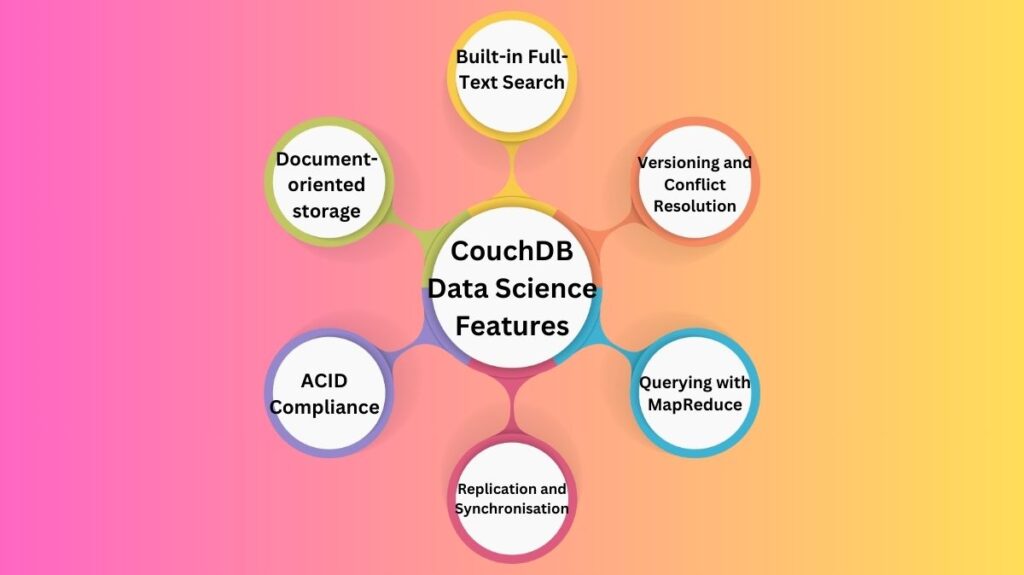CouchDB in Data Science: A Comprehensive Overview
Data scientists must efficiently organise, store, and retrieve massive amounts of data. Unlike relational databases, NoSQL databases store unstructured and semi-structured data differently. NoSQL database Apache CouchDB is popular. This article describes CouchDB’s position in data science, its benefits, and its application in workflows.
What is CouchDB?
With flexibility, scalability, and fault tolerance, Apache CouchDB stores, maintains, and retrieves data. Document-oriented architecture stores semi-structured or unstructured data as JSON-like documents. CouchDB contains real-world data without schemas, unlike relational databases.
CouchDB replicates data over several nodes, making it highly available and fault-tolerant. Data science environments require distributed data to be accessible and analysed across systems, making this crucial.
Why CouchDB for Data Science?
Data science uses structured (relational databases) and unstructured (text, logs, sensor data) data. Data scientists benefit from CouchDB for the following reasons:
Schema Flexibility: CouchDB lets data scientists store data without a schema. This is critical in data science, as data sources and structures change over time.
JSON-Based Documents:CouchDB stores data as JSON documents. JSON is popular in data science because of its simplicity and capacity to describe complicated hierarchical structures. CouchDB is great for API, log, and sensor data since its document model stores diverse and complicated data.
Scalability: Processing huge datasets on several servers is common in data science. Replication and sharding help CouchDB scale horizontally. Data scientists can use CouchDB clusters to scale data storage and processing to manage more data.
Failure-Tolerance and Availability: Data loss or downtime can hurt data science research and analysis. CouchDB replicates data across many nodes for high availability. If one node fails, other nodes can still access the data.
MapReduce for Querying: CouchDB supports MapReduce functions. Complex querying and aggregation are needed by data scientists. CouchDB MapReduce lets users write custom queries to aggregate and filter huge datasets. This helps with data pretreatment, feature extraction, and transformation.
RESTful API:CouchDB’s RESTful HTTP API lets data scientists use HTTP queries to interact with the database. This enables CouchDB easy to integrate with Python, R, and data analysis packages.
Key CouchDB Data Science Features
Let’s examine CouchDB’s primary features that make it appealing for data science projects:

Document-oriented storage: CouchDB stores data in documents. Each document can hold strings, numbers, lists, and even additional documents. Data scientists find it easier to store varied datasets in one database with this flexibility.
ACID Compliance: CouchDB ensures transaction data consistency, isolation, and durability. Data science operations require data integrity throughout processing and manipulation.
Replication and Synchronisation: CouchDB’s built-in replication and synchronisation allow data dissemination across several nodes. Data scientists working in teams or across geographies might use this capability to share data.
Querying with MapReduce:MapReduce is powerful for complicated data queries and aggregation. User-defined Map and Reduce functions in CouchDB process and query big datasets. Big data searching and manipulation are made easier with this.
Versioning and Conflict Resolution: CouchDB lets users trace document changes over time. CouchDB automatically discovers and resolves conflicts (e.g., two users updating the same document). Data science initiatives with different team members working on the same datasets benefit from this.
Built-in Full-Text Search: CouchDB lets data scientists query documents using text. When working with textual data like social media postings, articles, or logs, this might save time compared to other search tools.
CouchDB Data Science Applications
CouchDB is useful for data intake, preprocessing, storage, and analysis. Let’s examine CouchDB’s data science uses:
- Data Science workflows absorb data from APIs, databases, files, and web scraping. CouchDB is ideal for varied data sources since it stores semi-structured and unstructured data. Data scientists can import JSON, CSV, or XML data into CouchDB for processing.
- Data scientists must analyse data in real time for IoT, fraud detection, and social media analysis. CouchDB is ideal for real-time analytics due to its high write throughput and real-time updates. Data scientists can analyse streaming data in CouchDB using MapReduce queries.
- Data preprocessing requires data aggregation and manipulation. CouchDB MapReduce lets data scientists develop custom aggregation methods to efficiently analyse huge datasets. This helps with massive data and sophisticated transformations.
- Collaboration in Data Science: Many data science projects include teamwork to analyse and alter data. CouchDB’s replication and synchronisation make dataset collaboration easy. Distributed database systems let data scientists share, track, and settle issues.
In data science, time-series data like sensor readings, stock market values, and server logs is stored and analysed. CouchDB efficiently stores time-series data with timestamps and other metadata in JSON documents. CouchDB’s replication and querying allow large-scale time-series data processing.
Integrating CouchDB with Python, R, and Jupyter notebooks is simple. Python modules like requests let data scientists use the CouchDB API and analyse data. Distributed tools like Apache Spark or Apache Kafka can process CouchDB data.
Conclusion
A strong and adaptable NoSQL database, Apache CouchDB benefits data science applications. Data scientists working with massive datasets, unstructured data, or real-time analytics would love its document-oriented paradigm, scalability, fault tolerance, and capacity to manage different and developing data formats. CouchDB allows collaborative data science projects using replication and synchronisation, enabling teamwork.
CouchDB’s MapReduce querying and built-in full-text search let data scientists analyse and process data efficiently. CouchDB is a dependable data science solution for ingesting data from multiple sources, real-time analytics, and time-series data storage. Data scientists can improve data processing by incorporating CouchDB due to its scalability, versatility, and robust features.
